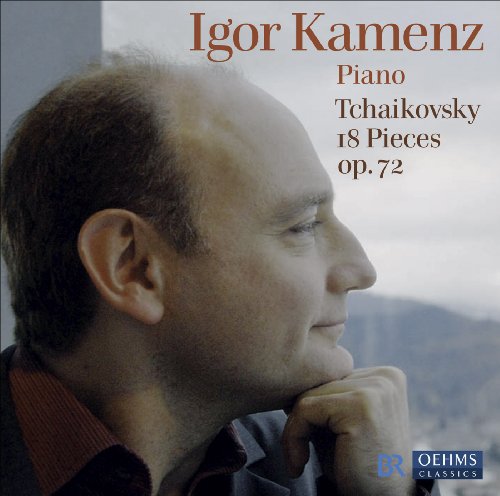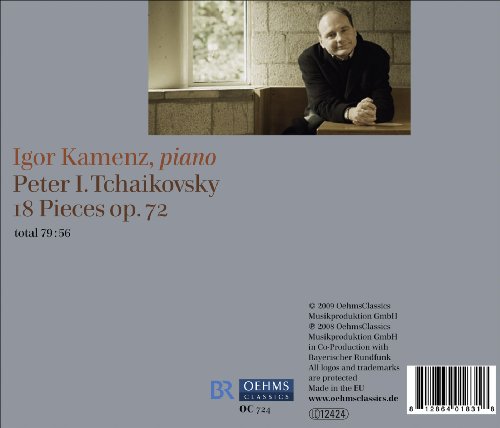Pyotr Ilyich Tchaikovsky Album: «Tchaikovsky: 18 Pieces, Op. 72»

- Title:Tchaikovsky: 18 Pieces, Op. 72
- Release date:2009-08-25
- Type:Audio CD
- Label:Oehms
- UPC:812864018318
- 1Morceaux (18) for piano, Op. 72: Impromptu in F minor
- 2Morceaux (18) for piano, Op. 72: Berceuse in A-flat major
- 3Morceaux (18) for piano, Op. 72: Tendres reproches in C-sharp minor
- 4Morceaux (18) for piano, Op. 72: Danse caractéristique in D major
- 5Morceaux (18) for piano, Op. 72: Méditation in D major
- 6Morceaux (18) for piano, Op. 72: Mazurque pour danser in B-flat major
- 7Morceaux (18) for piano, Op. 72: Polacca de concert in E-flat major
- 8Morceaux (18) for piano, Op. 72: Dialogue in B major
- 9Morceaux (18) for piano, Op. 72: Un poco di Schumann in D-flat major
- 10Morceaux (18) for piano, Op. 72: Scherzo-fantaisie in E-flat minor
- 11Morceaux (18) for piano, Op. 72: Valse-bluette in E-flat major
- 12Morceaux (18) for piano, Op. 72: L'espiègle in E major
- 13Morceaux (18) for piano, Op. 72: Echo rustique in E-flat major
- 14Morceaux (18) for piano, Op. 72: Chant élégiaque in D-flat major
- 15Morceaux (18) for piano, Op. 72: Un poco di Chopin in C-sharp minor
- 16Morceaux (18) for piano, Op. 72: Valse à cinq temps in D major
- 17Morceaux (18) for piano, Op. 72: Passé lointain in E-flat major
- 18Morceaux (18) for piano, Op. 72: Scène dansante (Invitation au trépak) in C major
It's strange that more of Tchaikovsky's piano works aren't better known. Aside from the First Piano Concerto, perhaps the Sonata, Op. 37 and The Seasons, very few of his pieces are ever heard in the concert hall, at least outside Russia. And as far as I know there is only one other recording of the present work, the 18 Pieces (also called 18 Morceaux), Op. 72. That is the one by Mikhail Pletnev, which I have not heard. This CD was the first time I'd ever heard this music. And what a delight these pieces are individually and in sum. (And how fortunate that the eighteen pieces fit tidily on one CD; they come in at just under 80 minutes). The works themselves vary from things that an advanced amateur could play (e.g., No. 2, the dreamily lovely Berceuse) and some that are virtuosic (e.g., No. 4, Danse caractéristique or No. 10, Scherzo fantaisie). Most of the works are sunny, or at least serene; very few are solemn or dour. I suppose it is too much to read into it, but these pieces, the last piano work Tchaikovsky wrote, were composed in his last year of life and there is nothing here to suggest depression (although they were the next thing he wrote after his 'Pathétique' Symphony which certainly has more than its share of melancholy).
Much of this music reminds one of Tchaikovsky's ballet music. Indeed, there are some individual pieces that come across as ballet scenes, with presentation and variations, as in No. 6, Mazurque pour danser, or No. 11, Valse bluette, the latter of which combines elements of The Nutcracker's Chocolate Divertissement and the Waltz of the Flowers. There are also some pieces that are homages to composers Tchaikovsky loved: No. 9, Un poco di Schumann, and No. 15, Un poco di Chopin. And there are echoes of Liszt's Liebestraum No. 3 in No. 14, Chant elégiaque. This is not to say that Tchaikovsky copies those composers (although the first bars of Chant elégiaque might be accused of it), but rather that he distills their style into his own inimitable music. And he even imitates himself as in No. 15, Valse à cinq temps, which has echoes of the 5/4 movement of the 'Pathétique' Symphony. And No. 8, Dialogue, could have been lifted from 'Yevgeny Onegin', although it is entirely original.
There is not a weak piece in this set of eighteen. Melody abounds -- you know and surely love Tchaikovskian melodies -- and atmosphere is expertly limned. As for this performance I have nothing but positive things to say about the playing of Igor Kamenz, a pianist I'd never encountered before. He is a fortyish Siberian who is also a conductor who studied with, among others, Sergiu Celibidache. He has recorded widely in Europe; I find at least seven other recordings listed here at Amazon. He clearly is a formidable technician and that skill is allied with musicality of the first rank. I will be seeking out other recordings of his, particularly one on which he plays music by Rachmaninov, Schubert and Liszt
and a collection of Beethoven sonatas
.
Strongly recommended.
Scott Morrison


